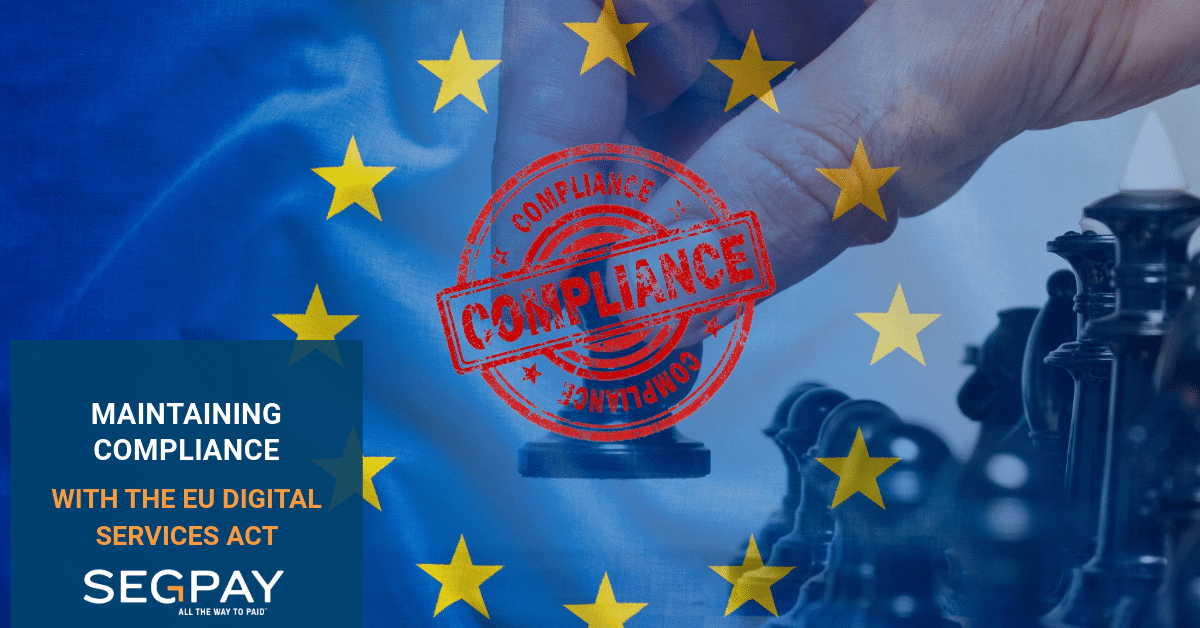Key Takeaways
- The DSA is a new set of rules that regulates online services in the EU, such as e-commerce platforms, marketplaces, social media networks, and online advertising providers.
- The DSA seeks to create a safer and more open digital space for users and businesses by imposing new obligations and responsibilities for service providers and enhancing rights and protections for users.
- The DSA affects e-commerce and advertising businesses that operate in the EU or target EU customers in areas such as data privacy and consent, cookie policy and user tracking, data security and protection, content and advertising transparency, localization and multilingual content, compliance management tools and services, and ongoing monitoring and adaptation.
- Segpay is a global payment facilitator of online credit card processing for subscription-based content providers and e-commerce merchants. Segpay can help you comply with the DSA by providing secure online payments, data protection, fraud prevention, localization, reporting, and customer service.
- 7 minute read
The EU Digital Services Act (DSA) is a new set of rules that aims to create a safer and more open digital space for users and businesses in the European Union. The DSA covers various online services, from e-commerce platforms and marketplaces to social media networks and online advertising providers. The DSA introduces new obligations and responsibilities for these service providers and enhanced rights and protections for their users.
Suppose you are running an e-commerce or advertising business that operates in the EU or targets EU customers. In that case, you need to be aware of the implications of the DSA and how to ensure compliance with its requirements. In this post, we will explain what is digital law, what it means for your business, and how Segpay can help you manage your online payments securely and efficiently.
What is the EU Digital Services Act?
The European Union’s recent enactment of the Digital Services Act (DSA) represents a comprehensive regulatory framework ensuring a safer and more transparent online environment for users. Under the DSA, digital platforms are accountable for identifying and curtailing harmful or illegal content and services. This legislation serves to safeguard user interests while promoting a responsible digital ecosystem.
The DSA applies to all online intermediaries that offer their services in the EU, regardless of where they are established. Online intermediaries are defined as any service that facilitates the provision of information or content by users or third parties on the Internet. Online intermediaries include e-commerce platforms, marketplaces, social media networks, search engines, cloud services, messaging apps, and online advertising services.
The main objectives of the DSA are to:
- Ensure high-level protection for users’ fundamental rights online, such as freedom of expression, privacy, data protection, non-discrimination, and consumer protection.
- Promote a fair and transparent digital environment for businesses and consumers by establishing clear rules and responsibilities for online service providers, preventing unfair practices and abuses of market power, and fostering innovation and competition.
- Enhance cooperation and coordination among national authorities and the EU institutions by creating a new governance framework for digital services involving independent oversight bodies, dispute resolution mechanisms, reporting obligations, and enforcement powers.
The DSA introduces new obligations and responsibilities for online service providers depending on their size, role, and impact on the digital ecosystem. These include:
General obligations
All online intermediaries must comply with specific basic requirements, such as:
- Establishing a legal representative in the EU
- Setting up an effective system for receiving and acting upon notices of illegal content or activity
- Informing users about their terms and conditions
- Cooperating with national authorities
- Ensuring data portability
- Providing annual transparency reports.
Additional obligations
Online platforms reaching in excess of 10% of the EU population (around 45 million users) must comply with additional obligations, such as:
Online platforms reaching in excess of 10% of the EU population (around 45 million users) must comply with additional obligations, such as:
- Conducting risk assessments
- Implementing measures to mitigate systemic risks.
- Appointing compliance officers
- Allowing external audits
- Providing access to data to researchers
- Enabling users to flag illegal or harmful content.
- Offering effective complaint mechanisms
- Ensuring traceability of business users
- Applying codes of conduct
- Adhering to specific rules on online advertising.
Specific obligations
Extensive online platforms that reach more than 10% of the EU population (around 45 million users) must comply with specific obligations. They are:
- Cooperating with a new European Board for Digital Services
- Notifying significant incidents to national authorities
- Providing access to data to public authorities
- Implementing measures to prevent the dissemination of illegal or harmful content.
- Ensuring transparency and accountability of algorithms.
- Empowering users to customize their preferences.
- Facilitating switching between platforms
- Preventing manipulation of information
- Providing human oversight of automated decision-making
- Applying codes of practice
- Complying with specific rules on targeted advertising.
What are the implications of the DSA for e-commerce and advertising businesses?
The DSA will significantly impact e-commerce advertising and businesses operating in the EU or target EU customers. These businesses will have to comply with the new rules and obligations imposed by the DSA and adapt to their users’ changing expectations and preferences. Here are some of the critical areas that e-commerce and advertising businesses should consider when preparing for the DSA:
Data Privacy and Consent
With the DSA emphasizing data privacy and user consent, e-commerce businesses must prioritize robust data privacy measures and transparent consent management processes. Implementing comprehensive data protection protocols and obtaining explicit user consent for data collection and processing are essential to compliance. It is imperative to uphold stringent data protection standards and ensure user data is handled following the Act’s provisions. More information about secure payment practices and their importance in maintaining regulatory compliance can be found here.
Cookie Policies and User Tracking
Under the DSA, businesses must adhere to stringent guidelines regarding cookie policy and user tracking. Organizations need to provide clear and comprehensive information about their use of cookies and tracking technologies. By offering users greater control over their data and providing transparent insights into data collection practices, businesses can foster trust and compliance with the DSA’s regulations.
Data Security and Protection
Ensuring robust data security measures is imperative for complying with the DSA. Implementing advanced data security protocols, encryption mechanisms, and secure data storage practices can help protect user’s information and prevent unauthorized access to or breaches of data. By prioritizing data security, you can demonstrate commitment to protecting user data and complying with the Act’s stringent data protection requirements.
Segpay can help you protect your business with secure online payments. Segpay is a global payment facilitator of online credit card processing for subscription-based content providers and e-commerce merchants. We offer many payment solutions designed to meet your specific needs and preferences.
Content and Advertising Transparency
Businesses must prioritize clear and honest advertising practices to align with the DSA’s emphasis on advertising transparency. Providing accurate and comprehensive information about products and services while refraining from deceptive marketing tactics is crucial. By fostering transparency in advertising content, businesses can build trust with consumers and uphold the principles of the DSA.
Localization and Multilingual Content
Adhering to the DSA’s localization requirements entails creating multilingual content that caters to diverse EU audiences. By offering content in various languages and tailoring marketing strategies to specific cultural contexts, businesses can effectively engage with EU consumers while complying with the Act’s localization guidelines.
Compliance Management Tools and Services
Utilizing robust compliance management tools and services can significantly facilitate adherence to the DSA’s regulatory requirements. Implementing automated monitoring systems, compliance management software, and data protection solutions can streamline the process of ensuring ongoing compliance with the Act. By leveraging advanced tools and services, businesses can proactively address regulatory challenges and maintain compliance with the DSA’s evolving provisions.
Ongoing Monitoring and Adaptation
Given the dynamic nature of regulatory frameworks, continuous content monitoring and adaptation are essential for sustaining compliance with the DSA. Regular review and updating of internal policies and procedures in response to evolving regulatory requirements can help businesses stay abreast of the latest compliance standards. By fostering a culture of ongoing monitoring and adaptation, organizations can proactively address compliance challenges and ensure adherence to the DSA’s evolving provisions.
Final Thoughts
The EU Digital Services Act represents a significant step toward fostering a safer and more transparent online environment. By prioritizing data privacy, transparent advertising practices, and robust compliance management, e-commerce and advertising businesses can effectively navigate the complexities of the DSA and maintain regulatory compliance while fostering trust with their consumers.
As you strive to ensure compliance with the EU Digital Services Act, Segpay offers comprehensive solutions to support your regulatory journey. Our advanced payment processing tools, data security measures, and compliance management services are tailored to help you navigate the complexities of the DSA seamlessly.
From robust data privacy protocols to transparent payment solutions, we are committed to empowering your business with the necessary resources to uphold regulatory compliance and build customer trust. Explore our diverse range of services today to discover how Segpay can be your trusted partner in navigating the intricacies of the EU Digital Services Act.
Want to learn more about the EU Digital Services Act and Compliance?
Contact us now to learn more about our tailored solutions and take proactive steps toward compliance. Reach out to us with your questions at [email protected]



